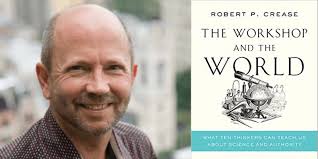
Robert B. Crease argues that brilliant minds change the world. He chooses 10 thinkers–some obvious, some obscure–and presents their ideas and impact on today’s world. Bacon, Galileo, and Descartes defined the beginnings of Modern Science. Vico warned that Science could be used for evil purposes and issued an early warning about political leaders like Trump. Mary Shelley’s classic, Frankenstein; or, The Modern Prometheus, suggests there are limits to Science. Comte promoted Science over Religion.
I’m very familiar with Max Weber whose The Protestant Ethic and the Spirit of Capitalism analyzed the economics of the early 20th Century. Weber’s insights into bureaucracies are still taught in Business Schools today. I had no idea who Kemal Ataturk was. Crease’s chapter explains how this Middle-Eastern thinker tried to reconcile Science with social concerns. I confess Edmund Husserl’s work in phenomenology always baffled me. As a college student taking philosophy classes, I attempted Husserl’s Cartesian Meditations: An Introduction to Phenomenology, based on four lectures Husserl gave at the Sorbonne, in the Amphithéatre Descartes, on February 23 and 25, 1929. I came away befuddled.
The final thinker in The Workshop and the World is a curious choice: Hannah Arendt. Arendt is best known for her book, Eichmann in Jerusalem (1963), where Arendt coined the inflammatory phrase “banality of evil” to describe Eichmann and the murderous bureaucracy he ran for the Nazis. Arendt’s book, Origins of Totalitarianism (1951), supplied enough evidence of the mis-uses of Science and Government to warn of planet-wide threats. Arendt is certainly a Big Picture philosopher. If you’re in the mood for some intellectual history, you’ll enjoy the very readable essays in The Worldshop and the World. GRADE: A-
TABLE OF CONTENTS:
Introduction 11
I
1 Francis Bacon’s New Atlantis 27
2 Galileo Galilei and the Authority of Science 48
3 René Descartes: Workshop Thinking 69
II
4 Giambattista Vico: Going Mad Rationally 93
5 Mary Shelley’s Hideous Idea 115
6 Auguste Comte’s Religion of Humanity 133
III
7 Max Weber: Authority and Bureaucracy 165
8 Kemal Atatürk: Science and Patriotism 189
9 Edmund Husserl: Cultural Crisis 205
IV
10 Hannah Arendt: Action 229
Conclusion 265
Acknowledgments 283
Notes 287
Index 301
If I were younger – and wanted to go into politics I’d take up this book . 🙂
But there are too many ideas around – and I’m still wondering which of them explain the success of people like Trump, Boris Johnson, Salvini, LePen (all European far right politicians with crazy ideas, but very successful)).
Politology is a full time job – thanks but no thanks!
Wolf, I know what you mean. Just watching Trump’s antics is exhausting!
I never profited much from reading philosophy, but the lives of the philosophers are often fscinating.
Dan, you’re right. Galileo found himself close to being executed when he announced that the Earth went around the Sun instead of the reverse (alarming the Roman Catholic Church). And Hannah Arendt had a love affair with Martin Heidgger who was also a philosopher and member of the Nazi Party.
A bit OT:
Many scientists ran that risk – and other people too, before Galileo was Giordano Bruno e g after a long career in Europe but in the end he was tortured and burned on the stake in Italy (wiki has interesting info on his influence on many people).
The mother of famous astronomer Kepler was accused of being a witch – luckily for her the already prominent son could help with her defense so she wasn’t executed like many others – just in the small Protestant town where she lived 8 women had to die So it wasn’t only the Catholics – but you know that already from the story of Salem…)
http://theconversation.com/the-astronomer-and-the-witch-how-kepler-saved-his-mother-from-the-stake-49332
Wolf, the Catholic Church feared Galileo’s facts about the Earth going around the Sun because if the Church was wrong about that, the Church officials dreaded that doubt would spread about their other teachings.
https://www.facebook.com/photo.php?fbid=10218777940029842&set=a.1462884022336&type=3&theater&ifg=1
Dan, that is so funny! Thanks for the link!
A few of these I have never heard of.
Patti, Crease’s essays inspired me to learn more about some of the obscure thinkers he includes.
Are you not a Monty Python fan? If you’ve watched (or listened) to the “Fish License/Eric the Half-a-Bee” sketch, you’d know that “Kemal Ataturk had an entire menagerie called Abdul!”
https://m.youtube.com/watch?v=2maz36_q6Fk
And that’s where my knowledge of Kemal Ataturk begins and ends. As for the popularity of Trump, et al, there’s a quote attributed to Julius Caesar (although it sounds like nothing he would say) that goes, “There are always more fools than wise men in any society—and the majority is bound to have the upper-hand.”
Deb, excellent quotes! Monty Python was always ahead of the curve. When I was a teenager learning Latin, our teacher had us translate some of Julius Caesar’s Commentaries on the Gallic War that I found thrilling!
Caesar was also the author we read at the end of school – there were quite a few like me who learned Latin instead of English (French was our first foreign language – I grew up in the French occupied zone of Germany …). It was a necessary condition to know some Latin if you wanted to go to a university to study medicine!
Our teacher was a big fan of De Bello Gallico (He had been an army officer …).
Wolf, I was okay at Latin but hopeless at Spanish. I didn’t get that language gene, either.
You found Commentaries on the Gallic War thrilling? Oh, George, sometimes I wonder.
Rick, I’ve read a lot war commentaries. Julius Caesar’s ranks up there with the best of them.